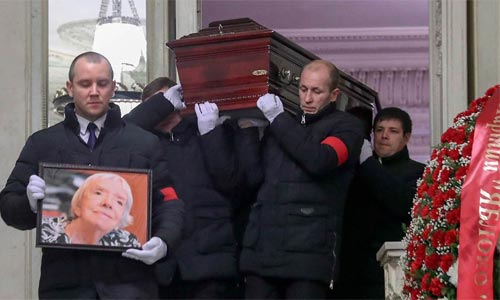In her 1993 memoir, The Thaw Generation: Coming of Age in the Post-Stalin Era, Lyudmila Alexeyeva points out that there is no good Russian word for “dissident.” A term that was sometimes used in its place translates as “otherwise thinkers.” Over time, the Soviet press adopted the English term, referring to disidenty. Alexeyeva, who died this month at the age of 91, certainly fell into that category.
A historian by training, Alexeyeva was widely recognized as Russia’s foremost human-rights advocate. In 1976, 20 years after Nikita Khrushchev’s “secret speech” denouncing Stalin’s crimes, Alexeyeva was among the founders of the Moscow Helsinki Group, focused on monitoring Soviet compliance with the Helsinki Accords, which had been concluded the previous year by 35 governments from Europe and North America.
The goal of the Accords, largely the result of the Soviet Union’s initiative, was to improve relations between the Cold War antagonists – and, for Soviet leader Leonid Brezhnev, to formalize international recognition of post-World War II national borders. The Soviets were so eager for an agreement that they accepted provisions that, barely noticed at the time, incorporated the principal post-WWII international human-rights norms. Through the Helsinki Accords, the Soviet Union effectively agreed to be bound by the 1948 Universal Declaration of Human Rights, which it had previously refused to endorse.
Brezhnev was so pleased that he had gotten the Helsinki Accords approved that he had the text published in full in the Communist Party’s official newspaper, Pravda. That is how Alexeyeva and her fellow disidenty noticed the human-rights provisions of the agreement. So they established the Moscow Helsinki Group to monitor the Soviet government’s compliance and report violations.
The tiny organization had an outsize historic significance. According to Robert Gates, who became Director of the CIA in 1991, in the midst of the Soviet Union’s death throes, those who monitored compliance with the Helsinki Accords may have done more to bring down the Soviet empire than the CIA itself.
Of course, the Kremlin did not take the Moscow Helsinki Group’s actions lightly. Members of the group – including its chair, physicist Yuri Orlov – were imprisoned. Alexeyeva was given the choice of prison or exile, and chose exile in the United States, where she continued to play an important role in defending human rights in the Soviet Union.
At that time, a couple of colleagues and I responded to the imprisonment of the Moscow Helsinki Group’s members, as well as other disidenty, by establishing Helsinki Watch, a US-based organization focused on freeing them. Alexeyeva was invaluable to our efforts, as she delivered for us detailed, reliable information on what was happening to her comrades.
Over the next decade, as Helsinki Watch evolved into the globally recognized group Human Rights Watch, Alexeyeva’s contributions continued to bear fruit. As an historian, she was committed to getting the facts right and ensuring that we had sufficient context. Her approach helped to shape Human Rights Watch’s research methodology, which has proved vital to our reputation for responding to developments not only rapidly, but also appropriately, based on accurate information. As director of the nascent Human Rights Watch, I relied heavily on Alexeyeva, who also became my friend.
In the late 1980s, when Mikhail Gorbachev began freeing disidenty from prison, Alexeyeva returned to Moscow, where she revived the Moscow Helsinki Group, which had been forced to suspend its activities in 1982, because almost all of its members had been in prison or exile. Since then, the organization has done battle with the Russian government time and again, including standing up to the ever-more despotic Vladimir Putin.
Under Putin, the challenge of upholding human rights in Russia has remained acute. The Kremlin has effectively prohibited some foreign donors, including the Open Society Foundations, from issuing grants in Russia, and has implemented a requirement that organizations receiving any foreign funding declare themselves to be “foreign agents” – essentially, spies.
Such policies have hit the Moscow Helsinki Group hard, because it was forced to choose losing much of its funding and, in turn, its staff. Yet the group has persisted.
Though Alexeyeva criticized Putin, he manifested a grudging respect for her, perhaps because he viewed her as a Russian patriot. On one occasion, Putin’s annual meeting with human-rights leaders coincided with her birthday, so he brought her a bouquet of flowers. He congratulated her again on her 90th birthday.
I doubt that Alexeyeva was much moved by such gestures. But they reflect the respect she commanded, and her commitment to conducting herself in a civil manner even when dealing with her opponents. She knew what she stood for, and so do the many people who benefited from her tireless efforts to protect human rights.
Home » Opinion » A Life Lived for Human Rights
A Life Lived for Human Rights
| Aryeh Neier

